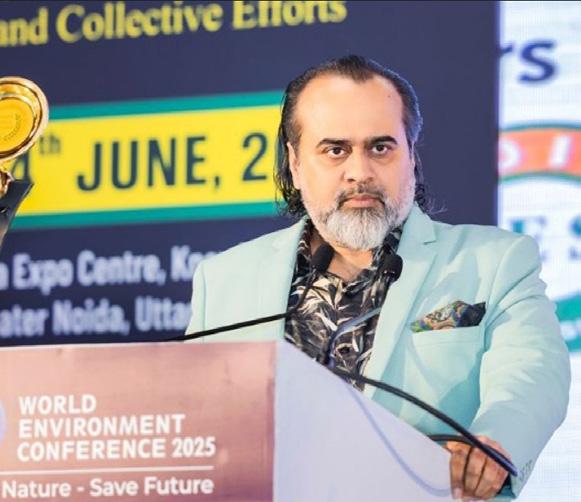
3 minute read
Man-made climate collapse, not natural’: Acharya Prashant on North India’s floods
New Delhi, Sep 7 (IANS) As relentless rains batter North India, philosopher and author Acharya Prashant has called the devastation “a mirror to our misplaced idea of progress”.
Speaking on the eve of the launch of his forthcoming HarperCollins book 'Truth Without Apology' at India International Centre, New Delhi, he warned that calling floods and landslides ‘natural calamities’ is a dangerous denial of their man-made roots.
Himachal Pradesh has lost over 340 lives since June 20, with landslides and flash floods cutting off entire districts. More than 1,300 roads remain blocked. In Jammu & Kashmir, rivers have surged past danger levels, while Punjab reports damage across 1,400 villages. Even Delhi and NCR are battling waterlogged streets, cancelled trains, and transport shutdowns. “The scale of loss dwarfs every relief effort,” Acharya Prashant said. “Himachal’s hills are collapsing because we drilled, blasted, and cemented them year after year,” he said. “When rivers are forced into concrete and wetlands into real estate, the monsoon is bound to return the debt.”
He pointed to the stark contrast between rural helplessness and urban negligence.
“Villages in the Himalayas collapse because they are too weak to resist. But what excuse do Delhi and Gurgaon have?
These are the richest cities. They drown not from poverty, but from negligence: storm drains buried, floodplains encroached, responsibility ending at the boundary wall.”
Acharya Prashant stressed that climate change is the decisive force behind today’s devastation.
“Asia is heating nearly twice as fast as the global average, which means more violent bursts of rain and more frequent cloudbursts.
NASA confirms floods and droughts have already doubled worldwide in two decades.”
According to the Council on Energy, Environment and Water, the average number of floodaffected districts in India has jumped from 19 a year (1970-2004) to 55 a year (2005-2019). “This is not seasonal wrath; it is climate collapse unfolding before us. Yet three out of four of India’s floodprone districts still lack proper early-warning systems.”
He added that this crisis is inseparable from global climate feedback loops:
“Permafrost is releasing methane, glaciers are vanishing, and coral reefs are dying. Once these cycles begin, they drive themselves. To dismiss floods as accidents of weather is not realism - it is denial. This is not pessimism, it is physics.”
On the deeper injustice, he noted: “The world’s richest 10 per cent drive emissions with private jets and excess lifestyles, while farmers and labourers lose lives and crops. Climate change is not only an ecological crisis. It is the violence of the rich upon the poor.”










